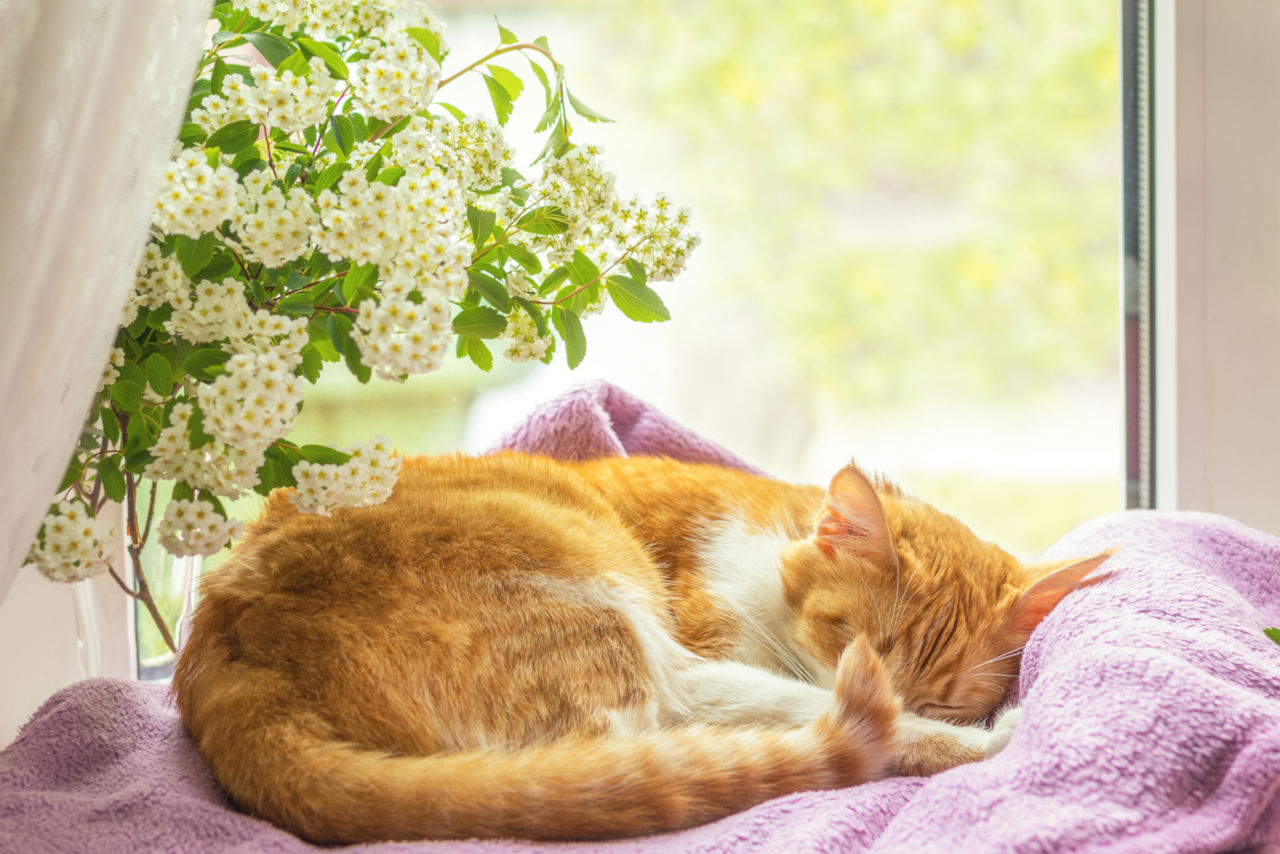Cats have good hearing. They use their ears to hunt and listen for possible threats. On the other hand, loud noises trigger a fear response in cats, so extended exposure to noise and loud sounds must be kept to a minimum. Cats prefer quiet rather than noise.
Cats prefer quiet because it helps them sleep and relax. Extended exposure to noise above 95 decibels may cause hearing damage in cats. But even a short, shrill noise of 120 decibels can endanger your cat’s hearing.
So, constant noise exposure should be avoided in cats. Excessive noise increases your cat’s blood pressure and causes hypertension. This is because your cat lives in a heightened state of stress.
So, cats prefer to live in silence.
Are Cats Sensitive to Noise?
Cats’ excellent hearing means that they are sensitive to noise. However, how sensitive they are depends on the upbringing and anxiety of the cat.
If you have a nervous cat, it will probably be afraid of sudden noises.
Has the cat lived in a quiet area before? If so, living with small children in a noisy, populous city is a big shock. Your cat will need time to get used to it.
How Noisy is Too Noisy for Cats?
The following list shows the average decibel levels for various noises:
- Birdsong: 40 dB
- Human conversations: 60 dB
- Car engines: 70 dB
- Television and radio: 75 dB
- Vacuum cleaner: 80 dB
- Human shouting: 90 dB
- Stereo system: 95 dB
- Car horns: 110 dB
- Power tools: 110 dB
- Sirens: 120 dB
Here’s how to reduce the risk of permanent damage to your cat’s hearing:
- Use headphones for watching TV or listening to loud music.
- Minimize contact with vacuum cleaners and similar noisy appliances.
- Make sure your cat has a quiet place to retreat to.
- Have your cat’s hearing checked by a veterinarian at least once a year.
Do Cats Prefer Quiet?
When given a choice, cats will always choose a quiet place. There are some understandable reasons for this:
- Cats use their hearing when hunting, which is easier in quiet.
- Surprises are less likely when a cat can hear everything.
- Cats can sleep more easily without loud distractions.
However, when a cat is used to quiet, it is even more sensitive to noise. This is because the quieter the environment, the more likely it is to have a nervous reaction to sudden noise.
Can Cats Sleep in Noisy Environments?
Cats can nap even in a noisy environment. But this is not their recovery sleep. Most cats catch up on their deep sleep when the house is empty during the day.
If a cat is napping, it’s not really sleeping. You may know that cats have a third eyelid. This helps the cat sleep and be aware of its surroundings simultaneously.
The same is true for their hearing. A cat is still alert in a noisy environment. It keeps one ear open to look for danger.
In this situation, the cat tunes out familiar sounds. The dishwasher, human conversation, or the television do not interest her. However, she jumps up and becomes alert at a sudden loud noise.
Make sure your cat has at least one place to retreat to. This way, she can retreat when overstimulated or wants to sleep properly.
What Sounds Do Cats Like?
However, there are some sounds that cats enjoy. These sounds include:
- Shaking and rattling
- Clicking and scratching
- Other cats
- Opening and closing doors
- The owner’s voice
- Birdsong
The sound of a door opening or closing piques the cat’s interest. She will wonder if a favorite human has returned.
Talk to your cat, too, because cats recognize people primarily by their voices, not by their looks or appearances.
Why Do Cats Like Shaking and Rattling Noises?
Cats can associate shaking and rattling sounds with mealtime. A cat perceives the following sounds at mealtime:
- Shaking a bag of dry food
- Pouring the food into a bowl
- Putting the bowl down on the floor
The same goes for an electric can opener. If your cat knows and hears this sound, he will be excited.
Why Do Cats Like Clicking and Scratching Sounds?
There are two possible explanations for this preference:
- The cat has been clicker trained.
- Your cat associates clicking sounds with treats.
These sounds likely stimulate the cat’s hunting instinct, causing an excited cat to click its tongue. You may hear this when a cat watches birds through a closed window.
When a cat hears a click, it suspects that prey is nearby.
Scratching elicits a similar response because cats use their good hearing to locate prey. The scratching sound of a mouse scurrying is fascinating to a cat.
What Sounds Do Cats Dislike?
However, there are also different types of noises that cats don’t like. These four types of noises, in particular, cause fear and anxiety in cats:
- Loud, sudden noises
- Loud, booming noises
- Sounds that indicate danger
- High, tinny sounds
However, you may be unable to protect your cat from all these noises.
Cats Hate Loud Noises
Loud noises irritate cats the most. Not only are they frightening, but they can also cause hearing damage.
These noises fall into short, violent sounds and long-lasting booms. Examples of short, loud sounds may include:
- Fireworks
- Car backfires
- Motorcycles roaring
- Car horns
- Slamming doors
- Explosions on television
Most cats jump up and run to safety when they hear these sounds. Such noises are sometimes unavoidable, such as on New Year’s Eve.
However, prolonged loud noises are equally unpleasant. These include:
- Vacuuming
- Electric tools
- Construction work outside/inside the house
- Shouting and loud conversations
If extensive construction occurs on or near your property, temporarily relocate your cat. Drills and power tools cause stress.
There is a risk for cats of permanent hearing loss and heart problems.
A noisy environment can be much more challenging to handle.
If you live near a daycare center, it won’t be quiet at certain times of the day. However, your cat will get used to this background noise over time.
Vacuuming is the main problem that cat owners face because cats usually hate the sound of the vacuum cleaner.
It is loud, takes a long time, and invades the cats’ private territory.
Cats Hate High-Pitched Noises
There are some sounds that only cats can hear. These are very high-pitched sounds.
The highest audible frequency of human hearing is 20,000 hertz. But most people over 20 cannot hear such high-pitched sounds.
Cats can hear tones up to 64,000 hertz. A cat can locate its prey up to 50 meters away by sound.
For this reason, cats stare at walls because they can hear rodents and insects inside. Cats can also hear ultrasonic devices like car remotes. Even an LED light bulb can emit sounds that your cat can hear.
A cat’s hearing deteriorates with age. At a young age, a cat’s hearing is most acute.
Cats Hate Sounds of Danger
Cats live in a state of constant alertness. At the first sign of danger, most cats flee the area.
One sound that most cats associate with danger is hissing. Sounds that sound like a hiss to a cat include:
- Crumpling a plastic bag
- Spraying of an aerosol can
- Boiling of a kettle
When your cat hears these sounds, he may hiss back or assert dominance over his territory. But escape is more likely.
Do Cats Like Music?
Cat owners often find that music attracts cats. Classical music is thought to particularly appeal to cats, but this is not entirely true. Cats do like to listen to music, but only when it’s intended for them.
In one study, scientists tested whether music appeals to cats by creating music appropriate for cats. The tempo and beat were designed to appeal to cats’ senses.
Purrs and feeding sounds were also added. The results were surprising. The cats rubbed up against the speakers. In doing so, they tried to claim the music for their own.
Do Cats Like White Noise?
Some cats are comfortable with white noise because they like routine.
An electrical device that continuously emits white noise can be soothing to a cat. It can block out unwanted background noise.
You may want to get a white noise device if you have an anxious cat or a noisy home.
Summary: Do Cats Prefer Quiet Or Noise?
Cats prefer quiet. They prefer to live in a quiet, peaceful environment free from yelling, construction, loud appliances, fireworks, and thunder.
Cats can tolerate some noise, but not if it is sudden. Loud noises are also unpleasant for cats.
Certain sounds like hissing are associated with confrontation and, therefore, physical danger. Your cat will flee from sounds that make him uncomfortable.


